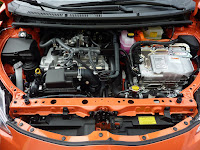The Ultimate Guide to Hybrid Engines: Everything You Need to Know
Hybrid Engines: Advantages and Disadvantages, Life Expectancy, and Maintenance Tips
Introduction:
As concerns over climate change continue to grow, the demand for hybrid engines has been on the rise. Hybrid engines offer a more fuel-efficient and Eco-friendly alternative to traditional gasoline engines. But what exactly is a hybrid engine, and how does it work? In this article, we'll explore the world of hybrid engines in-depth, including their advantages, disadvantages, and everything in between.What is a Hybrid Engine?
A hybrid engine is a powertrain that combines two or more energy sources to propel a vehicle. In most cases, a hybrid engine includes an electric motor and a gasoline engine. The electric motor is powered by a battery pack that is charged through regenerative braking and the gasoline engine. The battery pack provides the electric motor with the necessary energy to assist the gasoline engine during acceleration or provide propulsion during low-speed driving.Types of Hybrid Engines
There are several types of hybrid engines, including:Full Hybrid: A full hybrid engine can operate on electric power alone or in combination with the gasoline engine. These engines can also recharge the battery pack through regenerative braking.
Mild Hybrid: A mild hybrid engine cannot operate on electric power alone. The electric motor is used to assist the gasoline engine during acceleration or provide propulsion during low-speed driving.
Plug-in Hybrid: A plug-in hybrid engine can be recharged through an external power source. These engines can operate on electric power alone for a certain distance before switching to the gasoline engine.
How Does a Hybrid Engine Work?
A hybrid engine works by combining two or more energy sources to propel a vehicle. The electric motor is powered by a battery pack that is charged through regenerative braking and the gasoline engine. The battery pack provides the electric motor with the necessary energy to assist the gasoline engine during acceleration or provide propulsion during low-speed driving.When the vehicle is in motion, the gasoline engine and electric motor work together to provide the necessary power to propel the vehicle. During deceleration, regenerative braking is used to recharge the battery pack, reducing wear on the brake pads and improving fuel efficiency.
Advantages of Hybrid Engines
Hybrid engines offer several advantages over traditional gasoline engines, including:Improved Fuel Efficiency: Hybrid engines use less fuel than traditional gasoline engines, resulting in lower fuel costs and emissions.
Regenerative Braking: Hybrid engines use regenerative braking to recharge the battery pack, reducing wear on the brake pads and improving fuel efficiency.
Reduced Emissions: Hybrid engines produce fewer emissions than traditional gasoline engines, resulting in a cleaner environment.
Smooth and Quiet Operation: Hybrid engines provide a smoother and quieter ride due to the electric motor's instant torque and the gasoline engine's reduced workload.
Disadvantages of Hybrid Engines
Hybrid engines also have some disadvantages, including:Higher Initial Cost: Hybrid vehicles can be more expensive than traditional gasoline vehicles due to their more complex powertrain and technology.
Limited Driving Range: Hybrid vehicles typically have a shorter driving range than gasoline vehicles due to the limited battery capacity.
Battery Replacement Cost: The battery pack in a hybrid vehicle will eventually need to be replaced, which can be costly.
What is the Life Expectancy of a Hybrid Engine?
The life expectancy of a hybrid engine is dependent on several factors, including the make and model of the vehicle, driving habits, and maintenance. In general, hybrid engines are designed to last for at least 150,000 miles, with some models lasting up to 200,000 miles or more. However, the battery pack in a hybrid vehicle will eventually need to be replaced, which can be a significant expense.Is a Hybrid Engine Better Than a Gas Engine?
Whether a hybrid engine is better than a gas engine depends on the individual's needs and preferences. Hybrid engines offer several advantages over gas engines, including improved fuel efficiency, reduced emissions, and smoother operation. However, hybrid vehicles can be more expensive to purchase and maintain than traditional gas vehicles.How to Maintain a Hybrid Engine?
Maintaining a hybrid engine is similar to maintaining a traditional gasoline engine, with a few key differences. Here are some tips for maintaining a hybrid engine:Keep the Battery Pack Charged: It's essential to keep the battery pack charged to ensure that the electric motor can assist the gasoline engine when needed. If the battery pack is not charged, the gasoline engine will have to work harder, reducing fuel efficiency.
Check the Fluids: Like traditional gas engines, hybrid engines require regular oil changes and fluid checks. Be sure to follow the manufacturer's recommendations for oil type and interval.
Monitor the Brakes: Hybrid engines use regenerative braking to recharge the battery pack, which can lead to less wear on the brake pads. However, it's still important to have the brakes checked regularly.
Follow the Manufacturer's Recommendations: Finally, be sure to follow the manufacturer's recommendations for maintenance and service. This can help ensure that the engine runs smoothly and efficiently for as long as possible.
Hybrid engines offer a more fuel-efficient and Eco-friendly alternative to traditional gasoline engines. While they have some disadvantages, such as higher initial costs and limited driving range, hybrid engines provide several advantages, including reduced fuel consumption and emissions, regenerative braking, and smoother operation. With proper maintenance, a hybrid engine can last for at least 150,000 miles or more, making it a reliable and long-lasting choice for those looking to reduce their environmental impact.



Comments
Post a Comment